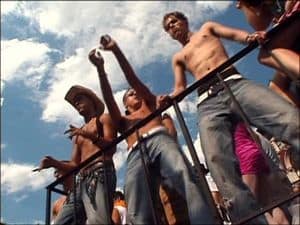Acceptance of gay people and support for their rights has reached an all-time high in this country. For the first time in history, a majority of Americans support same-sex couples' right to marry. We even have the expressed support of the first sitting president. Yet, as LGBT people delve deeper into the American mainstream, some argue that gays in America have abandoned some of the more seedy, sexual aspects of their past.
Such is the subject of Robert A. Schanke's book Queer Theatre and the Legacy of Cal Yeomans, as well as his recent HuffPostGay piece "The Gay Sexual Explosion That Has Been Nearly Forgotten". In his piece, Schanke chronicles some of his earlier exploits in New York City during the mid-1970's, specifically touching on such old haunts as The Anvil, The Spike, The Mineshaft, and the previously-abandoned warehouse district near the Hudson River. Much to his dismay, none of the places he describes in his piece are characteristic of their former selves. He opines…
"Today, in part because of AIDS, very few of those popular gay cruising sites still exist. In our current desire to acquire civil rights equal to the straight community, we have chosen to assimilate and to clean up our act. When I recently explored some of my old haunts, I was amused. The Anvil is now a gentrified, chic restaurant, complete with white linen tablecloths and candles. The waterfront along the Hudson River has become the lovely, serene High Line public park."
 According to him, "for over a decade after Stonewall, a gay man could have sex in New York almost anywhere, anytime, 24/7." As to whether or not that is still the case could certainly be the subject of debate. While gay cruising and hookup culture has almost certainly changed over the years, just because it is different doesn't necessarily mean that it doesn't exist. One quick sweep of smartphone apps such as Grindr, Scruff, and GuySpy (just to name a few), or sites like Adam4Adam, Gay.net, or even Craigslist (again, just to name a few), and one could certainly find plenty of willing sexual partners at any time of day, in virtually any city in the country. Thus, perhaps the contemporary gay movement hasn't done away with its sexual nature entirely. Instead, technology has allowed for cruisers to browse potential partners in the comfort of their own home.
According to him, "for over a decade after Stonewall, a gay man could have sex in New York almost anywhere, anytime, 24/7." As to whether or not that is still the case could certainly be the subject of debate. While gay cruising and hookup culture has almost certainly changed over the years, just because it is different doesn't necessarily mean that it doesn't exist. One quick sweep of smartphone apps such as Grindr, Scruff, and GuySpy (just to name a few), or sites like Adam4Adam, Gay.net, or even Craigslist (again, just to name a few), and one could certainly find plenty of willing sexual partners at any time of day, in virtually any city in the country. Thus, perhaps the contemporary gay movement hasn't done away with its sexual nature entirely. Instead, technology has allowed for cruisers to browse potential partners in the comfort of their own home.
Then again, minority groups have always had to endure a bit of watering down when entering into the American mainstream. Malcolm X continues to be a difficult subject to teach in schools, due to some of his more radical teachings. Very often, those teaching about Helen Keller will conveniently gloss over her Socialist past. Such "cleaning up" is, to a certain extent, necessary when grade school teachers have to start teaching their students about the LGBT rights movement (something that this native FLoridian never got the chance to learn about until college). Thus, it will be the duty of scholars like Schanke to keep the more sexual aspects of the gay rights legacy alive.



